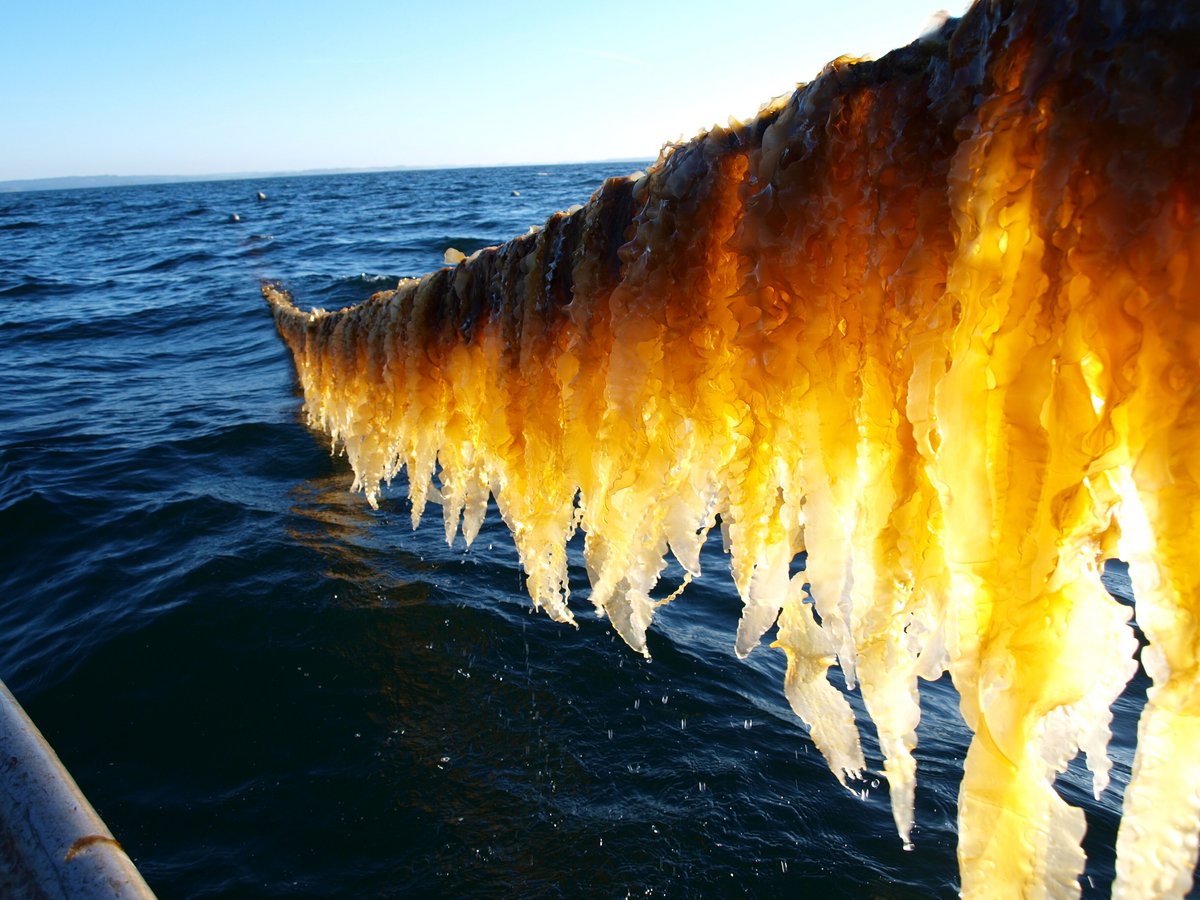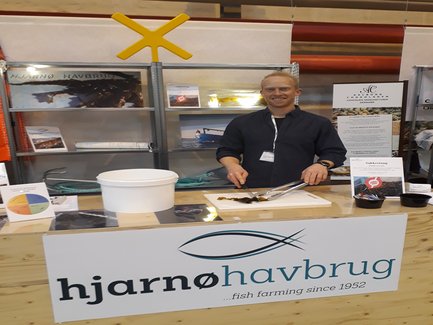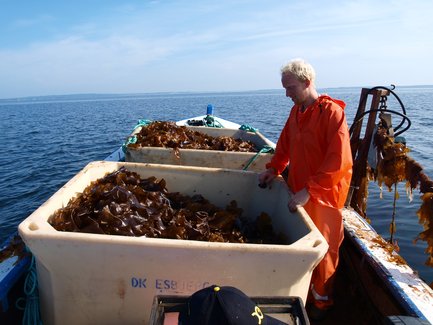Fresh, crisp and with a note of nuts. This is what the new superfood tastes like, and the food industry is waking up to its potential. But if we are to serve kelp for dinner, something needs to be done in the production. It has to be both sustainable and yields need to be large enough for business to be interested. Industrial PhD Teis Boderskov has taken up this challenge with Hjarnø Havbrug, Orbicon WSP and Aarhus University.

Young sugar kelp plants grow side-by-side on a 12-kilometre-long line rolled out into the sea in Horsens Fjord at Hjarnø Hage. The brown, fresh algae are growing and could become 30 tonnes of kelp when they are harvested. This is a good thing according to Teis Boderskov, an industrial PhD student, as sugar kelp is one of the vegetables of the sea, with many applications.
He has dedicated three years to developing more sustainable production of sugar kelp for industry.
- Production must start in earnest. Sugar kelp is part of the production of the future, he says.
Together with Hjarnø Havbrug, Orbicon WSP and Aarhus University, the industrial PhD is cultivating, harvesting and studying sugar kelp on lines in Horsens Fjord, and many others are following with interest. This is not just seaweed research. It is also an attempt to change the diet of Danes and livestock.
- Cultivating kelp and seaweed in Denmark is attracting great interest as a resource for food, skincare and animal feed, for example. And we also can improve the marine environment, says PhD supervisor and senior researcher at the Department of Ecoscience, Annette Bruhn.
However, production has not yet reached this stage, but seaweed in animal feed and products for humans has huge potential, according to Per Dolmer, who is a supervisor and works with the development of blue biomass production at Orbicon WSP.
- Seaweed will definitely be a much-used raw material in the future. Both as a snack, food and fodder. There are countless possibilities, and it can improve both animal welfare and human health, says Per Dolmer.

Organic sugar kelp is not yet being produced on an industrial scale, and in part this is because of EU production requirements. Artificial fertilizers cannot be used in organic production.
- We knew that there were some sore points in the production, and now we’re investigating how we get over these. Among other things, we’re testing different types of fertilizer that have been approved for organic production, and we’ve now found out what we can use, and what concentration will optimise organic production, explains Teis Boderskov.
In addition to organic production, the collaboration on the industrial PhD project also provides a framework for Teis Boderskov to create a protocol for further production, and this will make a significant difference in the seaweed industry.
- It’ll definitely make a difference. I’m contributing with development of the production process, and I’ve laid the foundation for the next step, so that Hjarnø Havbrug can stabilise production enough to ensure better security of supply for interested customers, says Teis Boderskov.
The kelp partnership is not just moving Danish sugar-kelp production forward. Hjarnø Havbrug, Orbicon WSP and Aarhus University are stronger from working together to educate an industrial PhD, explains Annette Bruhn.
- Collaboration with businesses makes very good sense for the university, because the more and the closer we collaborate, the more useful new technology and sustainable resources we can develop. The university has the research that industry can use, and industry can tell us what’s going on in the sector and where the needs for new knowledge lie. This gives us a good starting point to forge development together, she says.
But it can certainly be challenging for both parties, as they are often working with different time horizons, explains the supervisor. This also applies for Teis Boderskov, who is affiliated with the project and divides his time between the university, Hjarnø Havbrug and Orbicon WSP. However, this is also the part of the programme that can strengthen the students’ skills.
- The industrial PhD programme is a unique opportunity for collaboration between research and business, and the students really make a big difference. They’re dedicated to the research to be implemented in the company, and they have a huge advantage in their future choice of career from gaining this insight into both worlds, explains the senior researcher.

The first nets with sugar kelp were cast at Hjarnø Hage in autumn 2018. The first part of the industrial PhD entailed trying to cultivate kelp on large net structures, but since then focus has turned towards line production to secure the supply of kelp and to enhance the company's sales opportunities.
This leads to some challenges in the research. Lines are more sensitive to wind and weather and can get tangled up in each other. Furthermore, the wildlife in the fjord can also affect the sugar-kelp harvest.
- Sugar kelp is typically harvested at the end of the spring, when it is completely clean. If we let the kelp hang and grow over the summer, moss animals (Bryozoa) collect on the seaweed. This is a problem for industrial production, because companies don’t want the kelp with moss animals on it. Right now, we’re looking into the possibilities of letting the kelp grow over the summer to get a larger yield and a clean biomass the following year, says Teis Boderskov.
A high yield is good for business, but it is also good for the marine environment in Horsens Fjord, because the more sugar kelp we harvest, the more nutrients we remove from the nutrient-rich fjord. The business collaboration is not just about development and production. It is also about studying the effect of kelp cultivation on the marine environment in Horsens Fjord.
Teis Boderskov’s "Økotang" (eco-kelp) project is running from 01-02-2018 to 01-02-2021.